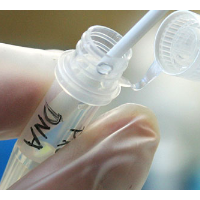Lawsuit Tries to Keep Uncharged and Unconvicted Arrestees out of DNA Database

The federal government and more than half the states, including California, have laws allowing them to collect a person’s DNA and store it in a database without there being a criminal conviction.
On Wednesday, all 11 judges of the U.S. Court of Appeals for the Ninth Circuit sat “en banc” to hear arguments―brought by the Northern California ACLU with pro bono assistance from Paul, Hastings, Janofsky & Walker LLP―that California’s Proposition 69, passed in 2004 with strong voter support, violated the Fourth Amendment and was an unconstitutional search and seizure.
The 2004 law required that DNA be collected from anyone arrested on suspicion of committing a felony and from some convicted of certain misdemeanors. No charges need to be filed. No conviction needs to be obtained. Arrestees who are not subsequently charged can request their DNA samples be expunged filling out a two-page request form.
Lily Haskell, one of the people challenging the law, was arrested at an anti-war demonstration. She was released without any charges being filed, but was compelled to give a DNA sample while in custody.
The law took effect in January 2009. The ACLU filed a request for a preliminary injunction in October 2009, but a couple months later lost Haskell v. Brown in U.S District Court. (The case has since been renamed Haskell v. Harris.) The ACLU got class action certification for its lawsuit, beat back the government’s attempt to have the case tossed and proceeded to lose a split decision in February 2012 before a three-judge panel of the U.S. Ninth Circuit Court of Appeals.
The ACLU appealed the panel’s decision to the appellate court’s full compliment of 11 judges and received a hearing on Wednesday.
Stories regularly appear in the media about old crimes being solved years, if not decades, after they were committed, with credit attributed to the burgeoning database of DNA samples the state is assembling. According to the FBI, California’s database has more than 1.4 million offenders on record and 496,872 arrestees, and is growing at the rate of 11,000 samples a month, thanks in large part to arrestee submissions.
Data is shared with local and federal authorities, including the FBI, which operates the Combined DNA Index System (CODIS). The federal database contains 9.81 million offenders and 1.18 million arrestees, and is growing at an accelerating rate. The database is often featured in popular television crime shows, including Law & Order, Criminal Minds, CSI, Bones, Numb3rs and Dexter.
Crime-solving is a critical part of the state’s argument for expanding the database beyond known criminals. The bigger the database, the more crimes that can be solved using DNA. The FBI says on its database website that, “Ultimately, the success of the CODIS program will be measured by the crimes it helps to solve.”
The ACLU argued that not only was the law unconstitutional, it was unnecessary. A hefty chunk of the ACLU court argument was devoted to challenging the government assertion that the addition of arrestee DNA resulted in more crime hits. Michael Risher, who argued the case for the ACLU, wrote afterward, “The government’s own data show that DNA collected from arrestees doesn’t help solve crimes any more than if it only took DNA from people it actually convict.”
The government likened the taking of DNA samples to fingerprinting, an issue that occupied a significant amount of the court’s time. Opponents argue that DNA sampling is not just a technological progression from fingerprinting; DNA are genetic blueprints that hold far more data and can be used, and misused, in myriad ways that fingerprints can’t.
Multiple cases similar to this one are threading their way through the legal system, and Chief Justice John Roberts has indicated the U.S. Supreme Court will likely take a Maryland case that, on its face, has a much narrower focus. At least one judge offered that it might be a good idea to let the high court rule on Maryland first.
–Ken Broder
To Learn More:
California and the Fourth Amendment (New York Times editorial)
Federal Judges Grill Lawyers over DNA Sample Law (by Paul Elias, Associated Press)
What I Said in Court Today about DNA Privacy (by Michael Risher, ACLU)
California DNA Collection from Suspects Draws Lawsuit from ACLU (by Paul Elias, Associated Press)
Federal Appeals Court to Hear Challenge to California DNA Collection Law (by Howard Mintz, San Jose Mercury News)
Ninth Circuit Will Re-Hear Mandatory DNA Collection at Arrest Lawsuit (ACLU)
Haskell v. Harris (U.S. District Court) (pdf)
- Top Stories
- Controversies
- Where is the Money Going?
- California and the Nation
- Appointments and Resignations
- Unusual News
- Latest News
- California Forbids U.S. Immigration Agents from Pretending to be Police
- California Lawmakers Urged to Strip “Self-Dealing” Tax Board of Its Duties
- Big Oil’s Grip on California
- Santa Cruz Police See Homeland Security Betrayal in Use of Gang Roundup as Cover for Immigration Raid
- Oil Companies Face Deadline to Stop Polluting California Groundwater





